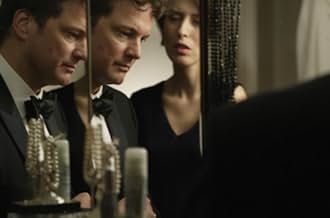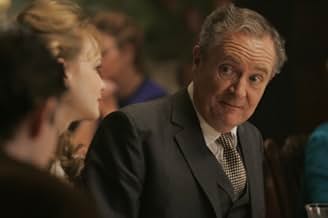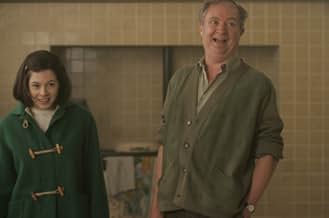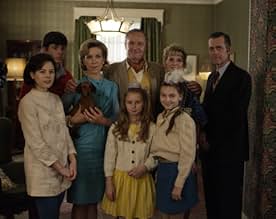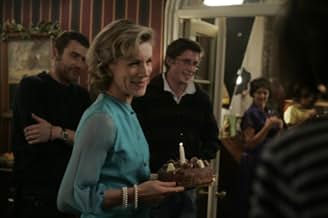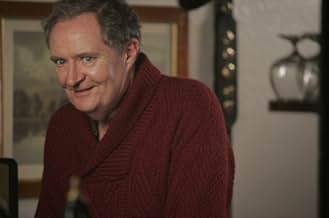And When Did You Last See Your Father?
- 2007
- Tous publics
- 1h 32min
NOTE IMDb
6,8/10
4,8 k
MA NOTE
Ajouter une intrigue dans votre langueThe story of a son's conflicting memories of his dying father.The story of a son's conflicting memories of his dying father.The story of a son's conflicting memories of his dying father.
- Réalisation
- Scénario
- Casting principal
- Récompenses
- 1 victoire et 12 nominations au total
Avis à la une
Blake Morrison's memories are served for public consumption in a respectful but slightly confused rendition. Jim Broadbent delight us, once more, with his overgrown child of a father that seems a figment of her son's imagination. His childishness seems to be his only flaw. I couldn't help but being reminded of Tim Burton's "Big Fish" this time, with radically different flights of fancy. Colin Firth plays the writer/son as a crashing bore. Was that on purpose? I've been longing to see Firth again in parts like the ones he so amazingly captured - "Apartment Zero" comes to mind. Here earnest or not earnest, loving, selfish and so forth I didn't quite get myself interested enough to care as much as I feel I should have. Matthew Beard, the younger Blake and Juliet Stevens as the mother, manage to create more intriguing characters. The film, however, belongs to Jim Broadbent - His character is a loving mix of assorted British loving eccentrics. The fact that this is the way her son Blakes remembers him, makes the experience worth while.
No other actor could have played Jim Broadbent's part. He's fantastic as the stout father, who can never quite relay his intimate feelings and emotions to his son, who is played with understated brilliance by Colin Firth. Sarah Lancashire deserves a mention, who has a small part but delivers with consistent aplomb (she's great on the telly), and Matthew Beard as the young Blake Morrison, upon whom the film and book are auto-biographically based.
As his father lays on his deathbed, the son recounts his childhood memories of the part his dad played in his life, whether funny, mean, sad or eccentric. Smart direction plus great lead performances, at least one of which is definitely worthy of an Oscar, adds to the overall emotional connection with the audience and culminates with a surprisingly touching ending, despite it's inevitability.
Having seen the film with my mum, who not only read the book by Blake Morrison, but had a father much like the one portrayed in the film, I found it all the more connectible. But this is not to say it is not for everyone. I think we can all relate to the fathers who can never quite express how they truly feel, and the childhoods spent moping and dwelling on seemingly world-shattering things.
The cinema i saw this in had about ten people at most, which is shocking! We need to see more British films like this, if just to keep the British film industry going. It deserves to fill a theatre and gain much more exposure than it currently has, regardless of those who might say it would have been better placed on television.
It is a superb film, thoughtfully shot, very well written and a joy to be in the company of for all of it's ninety minutes. And yes, I cried at the end. Sniff. But maybe you will too.
As his father lays on his deathbed, the son recounts his childhood memories of the part his dad played in his life, whether funny, mean, sad or eccentric. Smart direction plus great lead performances, at least one of which is definitely worthy of an Oscar, adds to the overall emotional connection with the audience and culminates with a surprisingly touching ending, despite it's inevitability.
Having seen the film with my mum, who not only read the book by Blake Morrison, but had a father much like the one portrayed in the film, I found it all the more connectible. But this is not to say it is not for everyone. I think we can all relate to the fathers who can never quite express how they truly feel, and the childhoods spent moping and dwelling on seemingly world-shattering things.
The cinema i saw this in had about ten people at most, which is shocking! We need to see more British films like this, if just to keep the British film industry going. It deserves to fill a theatre and gain much more exposure than it currently has, regardless of those who might say it would have been better placed on television.
It is a superb film, thoughtfully shot, very well written and a joy to be in the company of for all of it's ninety minutes. And yes, I cried at the end. Sniff. But maybe you will too.
"And When Did You Last See Your Father?" (2007) is an English film directed by Anand Tucker. It reminded me of the U.S. film, "The Savages," because the central plot of both movies involves a dying father who has not lived an exemplary life. Jim Broadbent is superb as Arthur, an obviously wealthy man who nevertheless goes through life cheating and manipulating people in small ways. He has a bluff, hearty, hail-fellow-well-met personality that charms people who meet him for the first time. In reality, he bullies his son and cheats on his wife. (Juliet Stevenson is excellent in the supporting role of wife and mother, as is Matthew Beard who plays Blake as a teenager.)
Colin Firth is equally convincing as Arthur's son, Blake. He's a successful award-winning writer, who nonetheless sees himself as perpetually in his father's shadow. Both men must come to grips with the situation when Arthur develops terminal cancer.
Broadbent and Firth look like each other, so it's easy to accept them as father and son. The film unfolds in an intelligent and interesting fashion. It's both artistically satisfying and philosophically challenging. I think the movie has been underrated by IMDb viewers. It's low key and thoughtful, but that's what it's supposed to be. There's nothing about it that struck me as artificially artistic. It's an honest and effective film, and worth seeking out and seeing.
Colin Firth is equally convincing as Arthur's son, Blake. He's a successful award-winning writer, who nonetheless sees himself as perpetually in his father's shadow. Both men must come to grips with the situation when Arthur develops terminal cancer.
Broadbent and Firth look like each other, so it's easy to accept them as father and son. The film unfolds in an intelligent and interesting fashion. It's both artistically satisfying and philosophically challenging. I think the movie has been underrated by IMDb viewers. It's low key and thoughtful, but that's what it's supposed to be. There's nothing about it that struck me as artificially artistic. It's an honest and effective film, and worth seeking out and seeing.
This is a beautifully written, well acted but above all wonderfully directed film looking at a man who learns about himself by finding out about his father. Colin Firth plays a real writer who wrote an auto-biographical novel about his relationship with his father played by Jim Broadbent. It's not a spoiler to say that the father is dying because that diagnosis is given very early on. While the family waits for him to die, events take Firth's memories effortlessly through his past showing him played very well by young actors at 8 and 17.
The events are funny and moving but restrained within a believable reality. Firth learns to live with his father's behaviour as we see that he isn't perfect either. It's positive about life without being sentimental, terrific film.
The events are funny and moving but restrained within a believable reality. Firth learns to live with his father's behaviour as we see that he isn't perfect either. It's positive about life without being sentimental, terrific film.
My last recollection of my father was the look on his face after I placed him in a nursing home in Miami, Florida. Wracked by Parkinson's disease and heart trouble, I was saddened by how far removed he was from the authoritarian and emotionally distant man I feared when I was young, yet a lifetime of resentment could not be entirely forgotten. Indeed, in our society the pressure to love our fathers no matter how awful their behavior is so strong that it often leaves children deeply conflicted. Anand Tucker's And When Did You Last See Your Father? is a film about such conflict, though it does not question the underlying bond of love. Based on the autobiography by British writer Blake Morrison with a screenplay by David Nicholls, the film's title asks the question "when" but seeks an answer that requires more than a date. It asks for the last time in your life when you really saw your father, not as an authority figure but as a complete human being, the complex individual that you may have never seen before.
The film charts the relationship between Doctor Arthur Morrison (Jim Broadbent) and his son Blake (Colin Firth), a writer, over a period of thirty years. As his dad lies dying of cancer, Blake is reminded of their difficult relationship over the years. Using mirrors to suggest there are many different angles with which to view life, Tucker catches events in Blake's life that remain with him and threaten to keep the two apart at a moment when they clearly need each other. Through extensive flashbacks showing Blake as a child, teenager, and adult, the film allows us to understand how events, both small and large, took on mass as the years went by. It makes clear that while Arthur was a devoted father, he was not above being overbearing, deceitful and duplicitous, especially regarding his infidelities with Aunt Beattie (Sarah Lancashire), an open secret in the household, though one that his wife (Juliet Stevenson) came to accept. Stevenson is outstanding in her role of the suffering partner who tries to make up for her husband's aloofness by giving the children her unconditional love.
In flashbacks, we see the eight-year old Blake (Bradley Johnson) seeing his father flaunting the rules by waving his stethoscope to get to the front of a queue waiting to enter a sports event; the fifteen-year-old Blake (Matthew Beard) putting up with his father's whimsy during a camping trip that left them soaked but liberated by driving lessons on the beach, his annoyance when his father, who called him "fathead", walked in on his first sexual awakening with a live-in-maid (Elaine Cassidy). We see the adult Blake (Colin Firth) recalling how his father refused to acknowledge his award of a literary prize at a gala, and then had the tenacity to call writing poetry "not a real job".
And When Did You Last See Your Father is a lyrical tone poem that is marked by brilliant performances. An honest and unsentimental film, it brings dignity to the subject of family relationships and has a powerful conclusion that left much of the audience, including myself, in tears. The best performances are by Matthew Beard as the sensitive but self-righteous adolescent who is hard put to give his father the benefit of the doubt and by Jim Broadbent as the overbearing but loving father. As the final days play out, the quality of Broadbent's performance is such that, while we understand Blake's misgivings, we can still see Arthur as a complex individual with both flaws and virtues. Blake still longs for his father's acceptance and, as his father lay dying, asks him: "It would be good to talk at some point, wouldn't it?" Yet the answer, "What about?" underscores the superficial banter that replaces conversation in many households.
The film charts the relationship between Doctor Arthur Morrison (Jim Broadbent) and his son Blake (Colin Firth), a writer, over a period of thirty years. As his dad lies dying of cancer, Blake is reminded of their difficult relationship over the years. Using mirrors to suggest there are many different angles with which to view life, Tucker catches events in Blake's life that remain with him and threaten to keep the two apart at a moment when they clearly need each other. Through extensive flashbacks showing Blake as a child, teenager, and adult, the film allows us to understand how events, both small and large, took on mass as the years went by. It makes clear that while Arthur was a devoted father, he was not above being overbearing, deceitful and duplicitous, especially regarding his infidelities with Aunt Beattie (Sarah Lancashire), an open secret in the household, though one that his wife (Juliet Stevenson) came to accept. Stevenson is outstanding in her role of the suffering partner who tries to make up for her husband's aloofness by giving the children her unconditional love.
In flashbacks, we see the eight-year old Blake (Bradley Johnson) seeing his father flaunting the rules by waving his stethoscope to get to the front of a queue waiting to enter a sports event; the fifteen-year-old Blake (Matthew Beard) putting up with his father's whimsy during a camping trip that left them soaked but liberated by driving lessons on the beach, his annoyance when his father, who called him "fathead", walked in on his first sexual awakening with a live-in-maid (Elaine Cassidy). We see the adult Blake (Colin Firth) recalling how his father refused to acknowledge his award of a literary prize at a gala, and then had the tenacity to call writing poetry "not a real job".
And When Did You Last See Your Father is a lyrical tone poem that is marked by brilliant performances. An honest and unsentimental film, it brings dignity to the subject of family relationships and has a powerful conclusion that left much of the audience, including myself, in tears. The best performances are by Matthew Beard as the sensitive but self-righteous adolescent who is hard put to give his father the benefit of the doubt and by Jim Broadbent as the overbearing but loving father. As the final days play out, the quality of Broadbent's performance is such that, while we understand Blake's misgivings, we can still see Arthur as a complex individual with both flaws and virtues. Blake still longs for his father's acceptance and, as his father lay dying, asks him: "It would be good to talk at some point, wouldn't it?" Yet the answer, "What about?" underscores the superficial banter that replaces conversation in many households.
Le saviez-vous
- AnecdotesMatthew Beard wore brown coloured contact lenses in order to look more like Colin Firth.
- ConnexionsFeatured in Starfilm (2017)
- Bandes originalesCold Cold Feeling
Written by JM Robinson
Published by EMI Music Publishing Ltd
Performed by T-Bone Walker
Licensed courtesy of EMI Records Ltd
Meilleurs choix
Connectez-vous pour évaluer et suivre la liste de favoris afin de recevoir des recommandations personnalisées
- How long is When Did You Last See Your Father??Alimenté par Alexa
- Is this movie based on a book?
- What was going on in the controversial bathtub scene?
Détails
- Date de sortie
- Pays d’origine
- Sites officiels
- Langue
- Aussi connu sous le nom de
- When Did You Last See Your Father?
- Lieux de tournage
- Sociétés de production
- Voir plus de crédits d'entreprise sur IMDbPro
Box-office
- Budget
- 8 000 000 $US (estimé)
- Montant brut aux États-Unis et au Canada
- 1 077 273 $US
- Week-end de sortie aux États-Unis et au Canada
- 39 210 $US
- 8 juin 2008
- Montant brut mondial
- 2 752 471 $US
- Durée1 heure 32 minutes
- Couleur
- Mixage
- Rapport de forme
- 2.35 : 1
Contribuer à cette page
Suggérer une modification ou ajouter du contenu manquant

Lacune principale
By what name was And When Did You Last See Your Father? (2007) officially released in Canada in English?
Répondre






